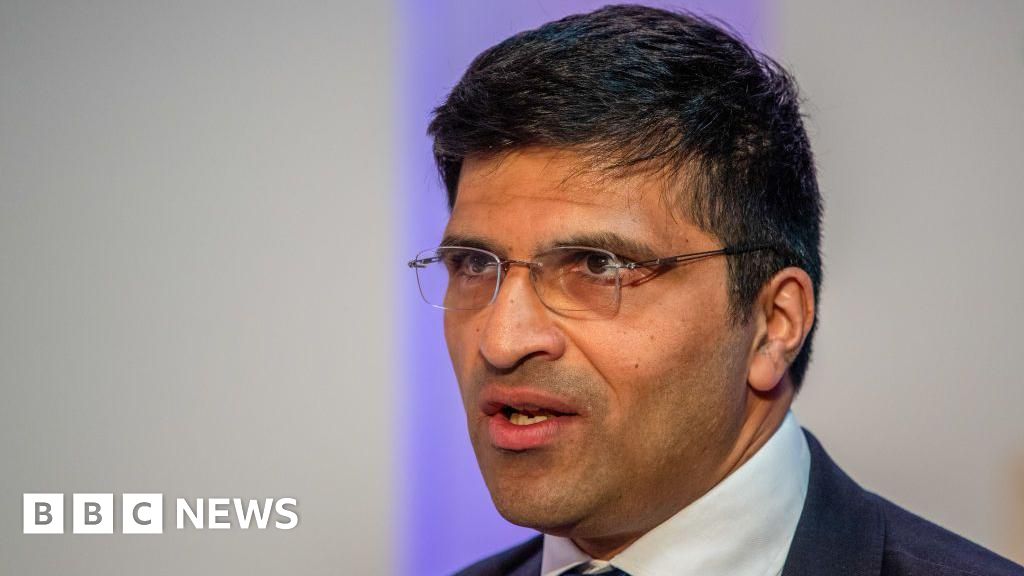Finance
Financial Conduct Authority boss says MPs' criticism 'not fair'

The boss of the UK’s financial watchdog has said criticism from MPs that it has failed to reform after years of scandal is “not fair”.
Nikhil Rathi, chief executive of the Financial Conduct Authority, said it is “tackling financial crime… on a scale that has never been done before in the UK”.
He was responding to a report from a cross-party group of MPs which said the FCA was “incompetent” and that its culture has “got worse rather than better”.
It also accused the FCA of failing to properly investigate the banks and other financial organisations it regulates, suggesting it may be too close to them.
The report published on Tuesday came in the wake of backlash against the FCA’s handling of the Neil Woodford investment scandal and other controversies such as its debanking report.
It referenced years of similar criticism from other reports, including a 2016 paper from the New City Agenda which said there was “a deep seated culture of box-ticking” at the FCA.
The report also hit back against the suggestion that the FCA had changed.
“It is imperative the reader doesn’t fall into the trap of thinking that the FCA… has already resolved the long list of problems the evidence that has been painstakingly gathered shows it has, because it hasn’t,” the report said.
However, in an interview with BBC Radio 4’s Money Box show, Mr Rathi defended the FCA against these claims and argued the regulator had improved.
“We will always stay focused on improving our operational performance, but I don’t think it would be fair to characterise the position as nothing has happened,” he said.
He added that the FCA is making “record numbers of financial crime prosecutions” and that it is “one of the most evolved consumer protection regimes in the world”.
The report goes on to state that the FCA may have been “captured”, meaning it is too aligned with banks and other financial organisations to act against them.
It argues there are “unmanaged conflicts of interest” within the FCA because of its role both to protect consumers and promote economic growth.
It suggested the watchdog should be stripped back to a regulator purely focused on consumer wellbeing – leaving the government to focus on economic growth.
It also suggested that the FCA’s leadership should be replaced “if necessary”, calling its current leaders “opaque and unaccountable”.
Mr Rathi said the issue of growth versus consumer protection “requires a debate”, but that Chancellor Rachel Reeves was pushing it to pursue growth.
He accepted that promoting growth can mean increasing risks for consumers, pointing to changes it made to allow more companies to list in the UK, such as on the London Stock Exchange.
“We were very transparent all the way through that discussion over the previous 18 months that this would bring more risk into the system, [but] it was judged that this was necessary,” he said.
“That does mean that over time a few more things will go wrong, but the risk appetite in the economy needed to adjust to support the growth that the economy needs.”
On the issue of accountability, Mr Rathi said the FCA appears before Parliament and select committees and publishes more data than “any other regulator in the world”.
A Treasury spokesperson told the BBC: “Many of the issues explored in the report have been extensively reviewed, and as a result the FCA has made a number of changes.”

Finance
Recruiting Journeys | Finance: Max Yamamoto ’24, Dimensional Fund Advisors

What was your recruiting journey like?
In the first year of my MBA, I applied to internship positions at investment management firms. Unlike consulting or investment banking, the process is not very structured. I found a bunch of firms by doing research on the internet, utilizing a list of employers created by the Career Development Office (CDO), and making cold calls to alumni or people inside the company. I applied to about 50 internships, and eventually landed one at Dimensional Fund Advisors.
I didn’t immediately get a return offer at the end of my summer internship. When I returned to SOM in the fall, I started to re-recruit for full-time jobs, but ultimately a position opened up at Dimensional Fund Advisors, and I accepted a full-time offer.
Which SOM classes prepared you for your current role?
Quantitative Investment, a core class for the Master’s in Asset Management program taught by Professor Toby Moskowitz, teaches you to research financial markets with a quantitative review. It’s directly related to what I’m doing right now, and has been very helpful. Another important core course was Asset Pricing Theory, taught by Professors Saman Majd and Jeffrey Rosenbluth; we learned how the market works and how you should view the market based on mathematical or financial theory. A third course is Employer, which is now called Workforce. What I learned in that class helped me understand how a company works, and prepared me to navigate professional culture in my internship and current role.
Finance
Financial Services Legislation Is in the Spotlight as the 119th Congress Settles In | PYMNTS.com

The 119th Congress has now been seated, and is poised to consider, to take up — or to scuttle — financial services legislation that may touch on everything from credit cards to earned wage access (EWA) to digital assets.
The incoming majorities belong to the Republicans, of course, and it’s no secret that president-elect Trump and other members of his party have expressed misgivings about the Federal Deposit Insurance Corp. (FDIC) and the Consumer Financial Protection Bureau (CFPB), and the roles and scope of those agencies are as yet undetermined.
The House Financial Services Committee now is being chaired by Rep. French Hill, R-Ark. The Senate Banking Committee is being chaired by Sen. Tim Scott, R-S.C.
What May Be Up
As for what may still be considered “outstanding”:
Front and center will be what happens with the Credit Card Competition Act. It’s been a long road for the CCCA, which, among other things, would enable card payments to be routed over at least one network that competes with Mastercard and Visa. Since being introduced in 2023, the act has been stalled in Congress, and should it be taken up again, there’s no surety that it would make it through into law, but it may indeed come up for debate. Now vice president-elect JD Vance had signed on to the bill.
At issue will be the ways in which the bill would change the dynamics of the card industry. Supporters say that the routing provisions would open up competition. But as Karen Webster noted in a recent column, “Notwithstanding a lack of understanding of how dual routing would work for credit card transactions, the flaw in Sen. Durbin’s bill is a lack of understanding of how the current credit card ecosystem works. And, more fundamentally, how platform ecosystems ignite and scale — and are monetized.”
Separately, the Earned Wage Access Consumer Protection Act would define EWA providers and sets strict operational boundaries, specifically regulating both employee-sponsored programs and direct-to-consumer offerings.
Digital Assets
There have been various attempts to have legislation that would set frameworks for digital asset markets to be structured. One bill, the Financial Innovation and Technology for the 21st Century Act passed in the House but did not make it through the Senate. The act would, among other things, set standards for digital assets and consumer protections, and segregation of funds.
Crypto and artificial intelligence (AI), of course, will also be on the agenda.
In an interview with PYMNTS, Mike Katz, a partner in Manatt, Phelps and Phillips Financial Services Group, said that “despite the razor-thin Republican majorities, there is a growing bipartisan consensus in Congress around the need for thoughtful, innovation-focused crypto and AI legislation,” adding, “It will be interesting to see if any digital asset bills are part of the tax-and-border-focused reconciliation package already being discussed in Congress. I’d expect a strong stablecoin bill to move quickly given existing bipartisan support.”
And he added: “Keep an eye out early in 2025 for a repurposed or chopped up version of the pro-crypto bill FIT21 [which passed the House with a large bipartisan majority in May]. Regardless of form or timing, new legislation will finally provide clarity on the questions of whether crypto assets are ‘securities’ or ‘commodities’ … and on which regulatory authority is charged with oversight.”
Finance
Protecting Your Future: How Cognitive Decline Affects Financial Decision-Making | University of Denver

RadioEd co-host Emma Atkinson sits down with medical doctor and finance expert Eric Chess to break down why financial decisions can be an early indicator of cognitive decline.
Podcast •
News •
Hosted by Jordyn Reiland and Emma Atkinson, RadioEd is a triweekly podcast created by the DU Newsroom that taps into the University of Denver’s deep pool of bright brains to explore the most exciting new research out of DU. See below for a transcript of this episode.
Show Notes
As we get older, things change. Our priorities shift, viewpoints and opinions evolve, and our bodies—and brains—age.
Many of these changes are good—we can celebrate the process of aging as one that invites wisdom and joy. But there are natural consequences of getting older, and one of those consequences is cognitive decline.
Eric Chess is a former medical doctor who has also earned degrees in law and business. Chess is the director of the Paul Freeman Financial Security Program at DU. He seeks to identify the earliest signs of cognitive impairment—and works to protect the lives and financial assets of older people experiencing cognitive decline.
Dr. Eric Chess is a physician, lawyer and professor with a focus on prevention, comprehensive well-being, financial security and older adults. He has over a decade of
experience in internal medicine practice (board certified), as a hospitalist and as an outpatient physician. He is currently a Clinical Professor at the University of Denver’s Knoebel Institute for Healthy Aging, serving as the founder and director of Aging and Well-being/The Paul Freeman Financial Security Program. Additionally, he serves as an adjunct Professor at the University of Denver’s Sturm College of Law and Daniels College of Business. Dr. Chess has an undergraduate degree in economics and political science, and a graduate law degree with experience as an attorney and economic consultant.
The Knoebel Institute for Healthy Aging creates and implements solutions for aging issues through multidisciplinary research, education and outreach by serving as an information clearinghouse for media on matters related to aging; educating and training a diverse workforce to serve a rapidly aging population; and promoting innovation, research and business development related to aging.
The Paul Freeman Financial Security Program combines the expertise of faculty, researchers and students at the University of Denver. Their interdisciplinary team of researchers in law, finance, psychology, social work, business, neuroscience, and medicine is led by Eric Chess, MD, JD. Goals of impact include four main areas: Research and Development; Outreach and Collaboration; Education; and Policy. Part of the program’s core mission is to address the need for more impactful solutions regarding financial exploitation and fraud of older adults. Target areas currently include developing a financial vulnerability scale, leading a state-wide collaboration, developing a financial-protective team legal instrument, and addressing the significant transfer of wealth affecting older adults and potential future generations and clients.
More Information:
-

 Business1 week ago
Business1 week agoThese are the top 7 issues facing the struggling restaurant industry in 2025
-

 Culture1 week ago
Culture1 week agoThe 25 worst losses in college football history, including Baylor’s 2024 entry at Colorado
-

 Sports1 week ago
Sports1 week agoThe top out-of-contract players available as free transfers: Kimmich, De Bruyne, Van Dijk…
-

 Politics6 days ago
Politics6 days agoNew Orleans attacker had 'remote detonator' for explosives in French Quarter, Biden says
-

 Politics5 days ago
Politics5 days agoCarter's judicial picks reshaped the federal bench across the country
-

 Politics4 days ago
Politics4 days agoWho Are the Recipients of the Presidential Medal of Freedom?
-

 Health3 days ago
Health3 days agoOzempic ‘microdosing’ is the new weight-loss trend: Should you try it?
-

 World1 week ago
World1 week agoIvory Coast says French troops to leave country after decades














